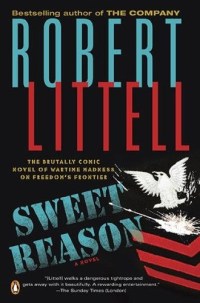Sweet Reason by Robert Littell
 Thursday, December 30, 2010 at 3:31PM
Thursday, December 30, 2010 at 3:31PM 
First published in 1974
Robert Littell has made a career of writing excellent espionage novels. Sweet Reason, his second novel (after The Defection of A.J. Lewinter), is a departure from that niche. This 1974 novel is a war story, or more accurately a war comedy: not as outrageously funny (and not nearly as profound) as Catch-22, but in the same satirical vein, and funny enough.
The U.S.S. Eugene F. Ebersole, a rusty, leaky, dilapidated destroyer commissioned during World War II, is dispatched to the Vietnam War by mistake. The novel takes place during the first three days after its arrival at Yankee Station. On Day One, the crew mistakenly sinks a junk (the captain proclaims a military victory and recommends himself for the silver star) and the destroyer plows into a downed jet during a rescue attempt (the pilot "was probably dead anyhow," the captain muses). Day Two begins with a Congressman boarding the destroyer for a photo op. To make sure the Congressman gets on the news, the destroyer finds a target to shoot at -- with unfortunate results. On Day Three, the sonar operator thinks he's spotted a submarine and the captain gives orders to sink it but ... well, you get the idea. Meanwhile, anonymous typewritten messages from "The Voice of Sweet Reason" appear, complaining of racial segregation aboard ship and urging the crew not to maintain the ship's engines or to fire its guns: a plea for mutiny that some crew members embrace.
The humor in Sweet Reason is amusing more than laugh-out-loud funny and the characters are a bit one dimensional despite the backgrounds Littell invents for them. As an indictment of war's folly or of career military officers, Sweet Reason succeeds, but only in a rather obvious way and not as well as other novels that have covered the same ground. The ending is a bit over-the-top. While Sweet Reason is an easy, sometimes entertaining read, Littell was wise to stick to espionage novels, where his authorial abilities are more triumphantly displayed. (If you want to read Littell at his best, you should try The Sisters, a novel that tells a grimly serious story with a wonderful comic touch.)
RECOMMENDED WITH RESERVATIONS
